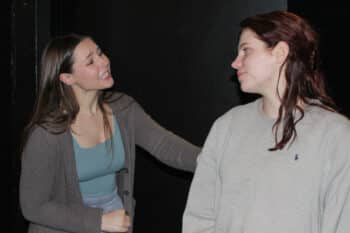 Neil Young rocked America with his anthem “Southern Man” on his 1970 album After the Gold Rush. Similarly, the Black and white bards Sheri Bailey and Dura Temple struck gold with their outstanding Southern Girls drama, which was first mounted during the Ronald Reagan era and is, happily, being revived at the Hudson Backstage Theatre with an all-female cast and a woman director, Zadia Ife.
Neil Young rocked America with his anthem “Southern Man” on his 1970 album After the Gold Rush. Similarly, the Black and white bards Sheri Bailey and Dura Temple struck gold with their outstanding Southern Girls drama, which was first mounted during the Ronald Reagan era and is, happily, being revived at the Hudson Backstage Theatre with an all-female cast and a woman director, Zadia Ife.
Set like To Kill a Mockingbird in smalltown Alabama, three of the eponymous females are white, two are Black, and one is biracial. The play’s trajectory follows them from small kid days, when they played girlish games in the Jim Crow South, through the Civil Rights era, the Black Power movement and beyond. Southern Girls is exemplary in how it rather perfectly dramatizes how world historical events—from U.S. apartheid to assassinations—deeply impact individuals in their daily lives and the choices they do, and cannot, make.
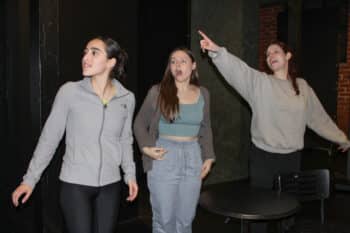 The award-winning Ife elicits a series of stellar performances from all of her gifted thespians. Despite the fact that Dolly Granger Jackson (Katie Spokely) is a racist, she shares a characteristic with the African-American Ruth Hurdle (Jessica Sade Ward). Both women chafe under the racial roles they have been conditioned and coerced to play. In an affecting monologue, the goody two-shoes, matriarchal older sister who is somewhat cut in the “Mammy” mold reveals that, at times, she too yearns to bust loose of societal confines that have proscribed her existence, and to burst into joyful dance and song.
The award-winning Ife elicits a series of stellar performances from all of her gifted thespians. Despite the fact that Dolly Granger Jackson (Katie Spokely) is a racist, she shares a characteristic with the African-American Ruth Hurdle (Jessica Sade Ward). Both women chafe under the racial roles they have been conditioned and coerced to play. In an affecting monologue, the goody two-shoes, matriarchal older sister who is somewhat cut in the “Mammy” mold reveals that, at times, she too yearns to bust loose of societal confines that have proscribed her existence, and to burst into joyful dance and song.
Brainwashed by 1950s style Stepford Wives syndrome, Dixie-style wannabe Southern belle Dolly pursues the housewife way of life. Her cleverly chosen name suggests that she is meant to be a living doll. Dolly is presumably the type of Southerner who would have attended Cotillion balls, become a charter member of the United Daughters of the Confederacy, and thrown hissy fits at the removal of monuments celebrating Stonewall Jackson and Jefferson Davis. Well, Hello Dolly—her rabid roleplaying proves to be her undoing, instead of the pursuit to the happiness promised by that other Southern Jefferson.
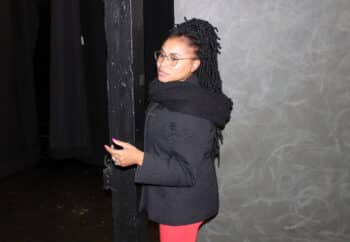 Channeling the white Charlotte Cecil Martin, Arianna Evangelina poignantly incarnates an interesting, sensitive character, who eschews racism, perhaps because her father has dabbled in what had been called “race mixing” and she has a half-Black sister, Wanda-Sue Johnson (Swisyzinna). Her mother, who does not take kindly to being cheated on and deserted by her husband, beats Charlotte. Perhaps because she was abused as a child, Charlotte lacks the confidence to rise to the occasion and fully follow her dreams, although she seems to continue writing (the society page of the local newspaper) and a tell-all novel in the tradition of another Southern scribe. But if Thomas Wolfe’s confessionals led to his writing You Can’t Go Home Again, Charlotte lacks the confidence to leave home in the first place, unlike her half-sister, Wanda-Sue, who wisely skedaddles to the big city, where she becomes a dancer of note in New York.
Channeling the white Charlotte Cecil Martin, Arianna Evangelina poignantly incarnates an interesting, sensitive character, who eschews racism, perhaps because her father has dabbled in what had been called “race mixing” and she has a half-Black sister, Wanda-Sue Johnson (Swisyzinna). Her mother, who does not take kindly to being cheated on and deserted by her husband, beats Charlotte. Perhaps because she was abused as a child, Charlotte lacks the confidence to rise to the occasion and fully follow her dreams, although she seems to continue writing (the society page of the local newspaper) and a tell-all novel in the tradition of another Southern scribe. But if Thomas Wolfe’s confessionals led to his writing You Can’t Go Home Again, Charlotte lacks the confidence to leave home in the first place, unlike her half-sister, Wanda-Sue, who wisely skedaddles to the big city, where she becomes a dancer of note in New York.
However, probably due to the heritage of her mixed parentage in the toxic segregated South, Wanda-Sue is unable to completely escape her inner demons. In character, Swisyzinna (who has starred in a number of horror movies, including as La’Nette in the Ouija franchise) performs several solo dances.
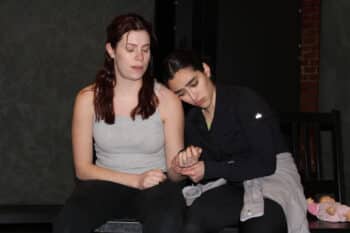 The character who most succeeds in breaking away from the Alabama milieu and pursuing her vision is June-Adele Taylor (Maria Jimena Gastelum). The daughter of the town’s doctor, June-Adele is an antiracist who admonishes the other whites when they use the “n-word,” and her stances raise issues regarding what role allies should appropriately play in movements. (Spitefully spurning well-meaning individuals whose sentiments and actions are on your side is not a very wise strategy, especially when you are already vastly outnumbered.)
The character who most succeeds in breaking away from the Alabama milieu and pursuing her vision is June-Adele Taylor (Maria Jimena Gastelum). The daughter of the town’s doctor, June-Adele is an antiracist who admonishes the other whites when they use the “n-word,” and her stances raise issues regarding what role allies should appropriately play in movements. (Spitefully spurning well-meaning individuals whose sentiments and actions are on your side is not a very wise strategy, especially when you are already vastly outnumbered.)
Whereas Ruth’s little sister Naomi Hurdle (Ash Saunders) supports Bobby Kennedy during the troubled 1968 presidential campaign, June-Adele campaigns for Senator Eugene McCarthy, the antiwar candidate who helped knock Lyndon B. Johnson out of seeking reelection. (Dolly, on the other hand, becomes a “Nixonette,” backing yet another despicable president in the Jeff Davis/Donald Trump hall of infamy category.) If I remember correctly, June-Adele, who aspires to visit Bali, remains professionally involved in electoral politics and becomes a writer after she leaves Alabama far behind in the rearview mirror. (In a bit of clever casting, the play’s most admirable character is depicted by a thespian who seems to actually be Mexican-American, not white. Touché!)
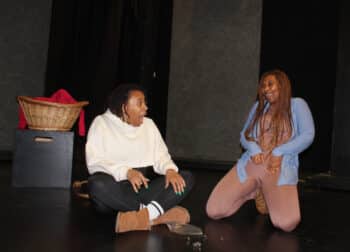 June-Adele’s garb (by costume designer Mylette Nora), which Dolly derides as “hippie” style, is one of the play’s indicators that “the times they are a-changin’,” as Bob Dylan croons in one of the mood- and scene-setting period songs played before the curtain lifts and during intermission (as well as to a lesser extent during the drama itself). Another clever sign of the passage of time from the somnambulistic 1950s to the sizzling ’60s are Naomi’s wigs, which signal her growing militancy, until she appears in an Afro that would have done Angela Davis and Vonetta McGee proud.
June-Adele’s garb (by costume designer Mylette Nora), which Dolly derides as “hippie” style, is one of the play’s indicators that “the times they are a-changin’,” as Bob Dylan croons in one of the mood- and scene-setting period songs played before the curtain lifts and during intermission (as well as to a lesser extent during the drama itself). Another clever sign of the passage of time from the somnambulistic 1950s to the sizzling ’60s are Naomi’s wigs, which signal her growing militancy, until she appears in an Afro that would have done Angela Davis and Vonetta McGee proud.
This deftly directed production generally has a naturalistic style, but does incorporate some more avant-garde techniques, such as a cinematic split screen effect, and the story sometimes jumps back and forth in time out of chronological order. Southern Girls also includes an evocative photo montage by projection designer Fritz Davis.
After the curtain drops, Jackson, Mississippi-born Evelia Jones, a direct descendent of Sally Hemings and Thomas Jefferson, said: “The playwrights who wrote this absolutely lived it. The play is very authentic.”
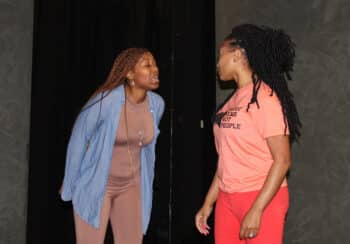 I attended Southern Girls the night that the video depicting the viciously lethal beating of Tyre Nichols by Memphis police (pigs being pigs) was released and am very sorry to say that this drama remains all too relevant. Probably the highest praise you could give this play is that if it was presented in Florida, fascistic Governon Ron DeMento—who has forbidden teaching Black history and being “woke”—would probably try to ban it and burn the script.
I attended Southern Girls the night that the video depicting the viciously lethal beating of Tyre Nichols by Memphis police (pigs being pigs) was released and am very sorry to say that this drama remains all too relevant. Probably the highest praise you could give this play is that if it was presented in Florida, fascistic Governon Ron DeMento—who has forbidden teaching Black history and being “woke”—would probably try to ban it and burn the script.
Through the Steel Magnolias-type of often tense interplay between the sextet of Southerners, Bailey and Temple’s saga is never preachy, always realistic and touching, and sometimes funny. Directed with a tight yet light touch by Ife, the talented cast brings their all-too-real characters vividly alive in what is a work of mass entertainment, not a solemn sermon. There is the usual lynching and rape that inevitably accompanies productions about the South during this period, so the play is for mature audiences, as well as for any theatergoer who loves great acting, racially themed dramas, women-made and -centered productions and plays combining enlightenment with entertainment.
This show admirably succeeds in a highly engaging way in dramatizing, as Neil Young sang: “Southern change gonna come at last.” Let’s hope that change spreads to the rest of this benighted country too, sooner rather than later.
All the Way West Productions’ of Southern Girls runs through February 26 on Fridays and Saturdays at 8 p.m. and Sundays at 3 p.m. at the Hudson Backstage Theatre, 6539 Santa Monica Blvd., Hollywood, CA 90038. Click here for tickets and more information.

